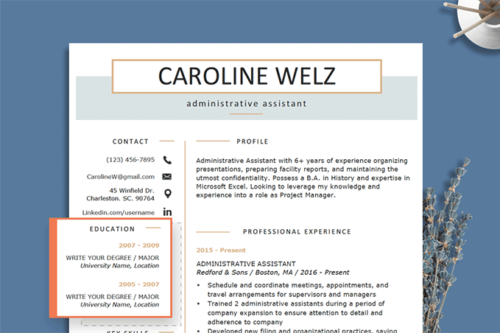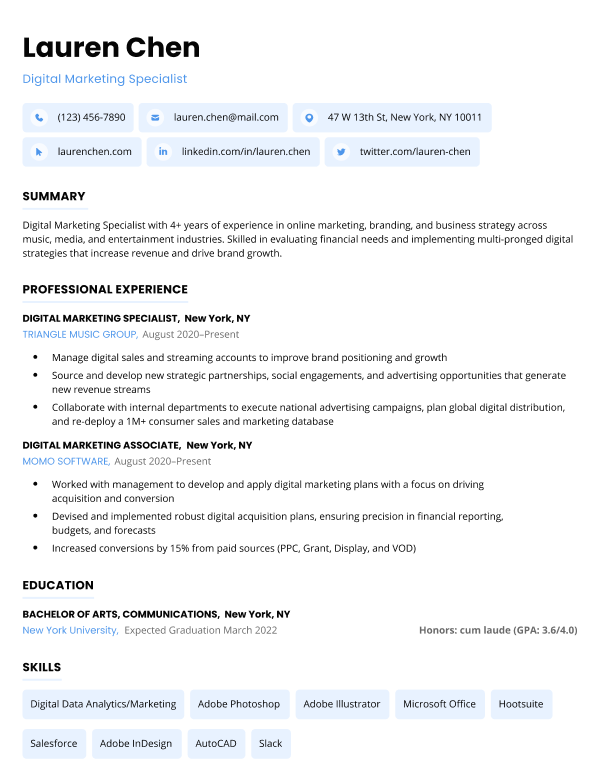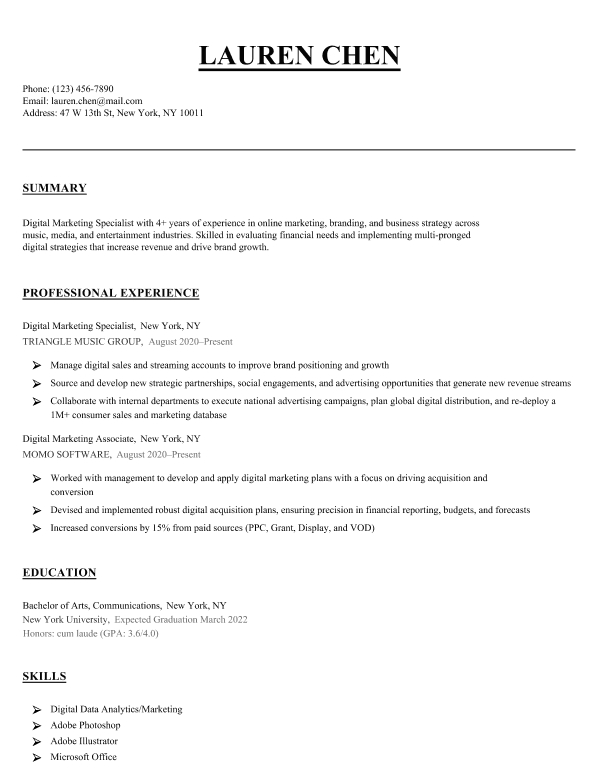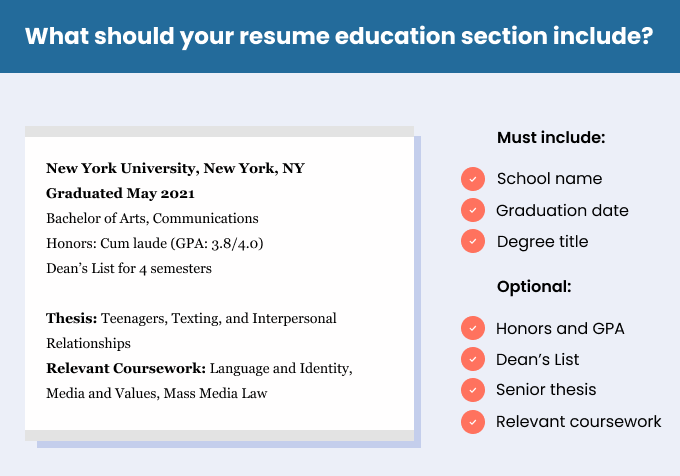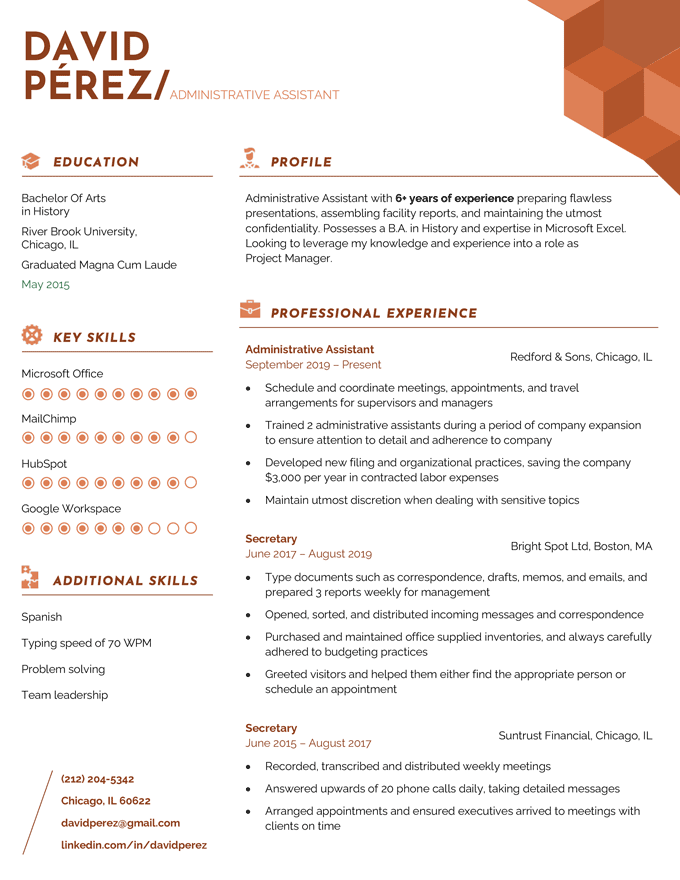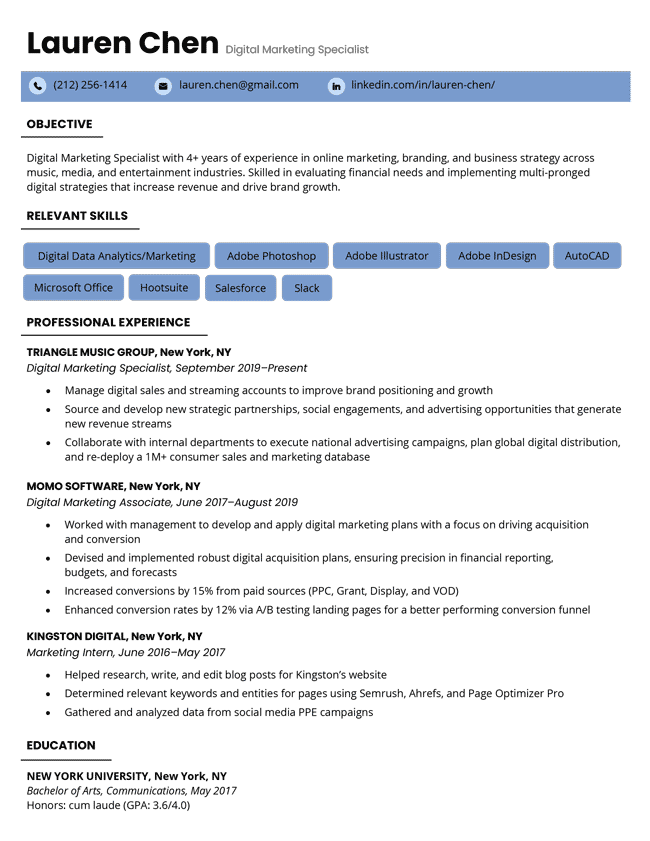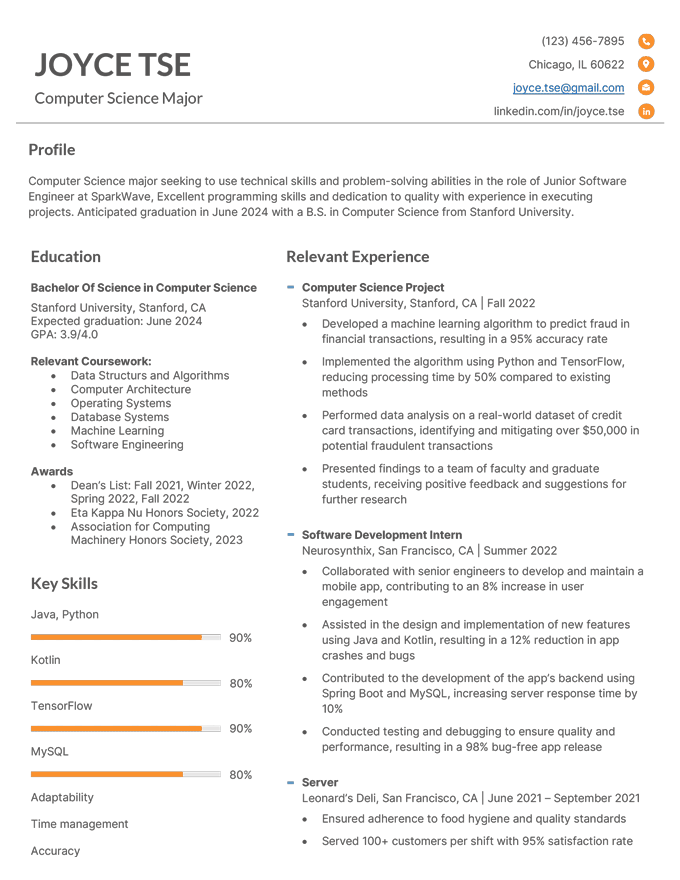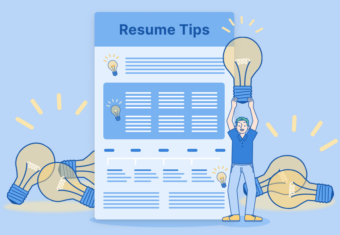In this article, we’ll walk you through what to include in your education section and how to format it, as well as provide some examples you can follow depending on your level of experience.
Our free-to-use resume builder can make you a resume in as little as 5 minutes. Just pick the template you want, and our software will format everything for you.
How to list education on your resume
Writing your education section doesn’t have to be complicated.
Watch the video below where our career expert Eva shows you exactly how to list your education on your resume, with helpful tips and examples.
Here’s exactly how to list education on your resume in three simple steps to highlight your most marketable qualifications:
1. Decide what to include in your resume education section
There are a few standard details you should always include in your resume education section. These are your:
- name and location of the school you received your highest degree from
- degree name/major (and minor, if applicable)
- graduation date (or anticipated graduation date)
Beyond this basic information, there are additional details you can include if you want to highlight some of your relevant academic achievements.
Here’s some optional information to consider listing in your education section:
- GPA (if above 3.5): Including a high GPA on your resume demonstrates that you’re capable of producing high-quality work and managing your time well.
- Honors and academic awards: Listing graduation honors (with distinction, cum laude, magna cum laude, or summa cum laude), academic awards (such as making the Dean’s list), or honor societies you’re a member of shows employers that you’re a high achiever.
- Scholarships and grants: Including merit-based scholarships and grants indicates to hiring managers that you’re driven and worth investing in.
- Thesis: A completed thesis is definitely an accomplishment worth showing off, particularly if the subject matter is relevant to the industry you’re applying to work in.
- Relevant coursework: Including relevant coursework on your resume shows employers that you have foundational knowledge in your field and skills to build upon.
- Extracurricular activities: If you took part in clubs or sports that demonstrate relevant skills, include these extracurricular activities in your resume as well.
Remember that you should only include information that’s relevant to the job you’re applying for. For example, only mention relevant coursework in your resume’s education section if the course topic is related to the job you’re applying to.
Only list your high school education if it’s your highest degree. If you have a Bachelor’s degree or higher, leave your high school details off your resume and focus on more relevant qualifications like your work experience.
2. Figure out where to put education on your resume
Once you’ve decided what information to highlight in your education section, you need to decide where on your resume to put it.
Although your resume’s format might sound unimportant, where you place your education section in relation to the other parts of your resume helps emphasize (or de-emphasize) your educational background. Choosing a resume template that follows the right format will help you highlight your strengths and make a good impression on potential employers.
Put your education section near the top of your resume if:
- you’re writing a student resume or you’re a recent college graduate,
- you’re currently pursuing a degree, or
- you lack relevant professional experience but have a degree related to the job you want.
In these circumstances, emphasizing your education can strengthen your resume, so list your education section above your resume’s work experience section. You could also consider using a format that prioritizes educational achievements, like the Harvard resume template.
Example of a resume with education listed at the top
Here’s an example of a resume with the education section featured near the top:
If you have more than a couple of years of relevant work experience, list your education below your work experience section. For most jobs, your education is less relevant to your ability to do the job than your hands-on work experience.Example of a resume with education listed below your experience
Here’s an example of a resume with the education section featured below the professional experience section:
If your education is the most relevant qualification you have for the job you’re applying to, make the most of your academic achievements by including details about them in an expanded education section.Example of a resume with an expanded education section
Here’s an example of a college student’s resume that uses an expanded education section to underscore their academic accomplishments:
Even though the candidate in this example doesn’t have much professional experience to include in their resume, they do a great job of showing employers how their education has equipped them with the experience and skills they need to do the job well.This candidate also uses a relevant experience section to give employers an in-depth look into an academic project they completed that directly relates to their target job. Including projects on your resume shows employers.
3. Format your education section properly
There are many ways you can format your resume’s education section. The most important thing is to list all necessary information clearly.
For example, you should always bold the most important information in your education section to help it stand out. For most people, this is the name of their school or their degree title.
Here are some examples of how to properly list education on your resume:
Resume education section example #1
May 2020
New York University, New York, NY
Bachelor of Arts, Communications
Resume education section example #2
New York University, New York, NY
B.A., Communications, May 2020
Additionally, if you want to list a double major on your resume, make sure the most relevant major comes first. Here’s an example:
Double major example
New York University, New York, NY
Bachelor of Arts
Communications, History
May 2020
Here’s an example of how to format your education section with additional information:
Additional information example
May 2020
New York University, New York, NY
Bachelor of Arts, Communications
Honors: Cum laude (GPA: 3.8/4.0)
Dean’s List for 4 semesters
Thesis: Teenagers, Texting, and Interpersonal Relationships
Relevant Coursework: Language and Identity, Media and Values, Mass Media Law
Active member of the Wagner Student Association and the NYU Arts and Culture Network
If you’re including relevant coursework on your resume, you can choose to format it like the example above, or add more detail by using bullet points that explain what you achieved in each course.
9 resume education section examples
Still not sure what the education section of your resume should look like? Here are nine different examples that demonstrate the different ways you can format your education section.
High school student
If you’re a high school student or don’t have a higher education degree, you should list your high school education on your resume.
Here’s an example of how to list your GED if you’re:
Currently in school
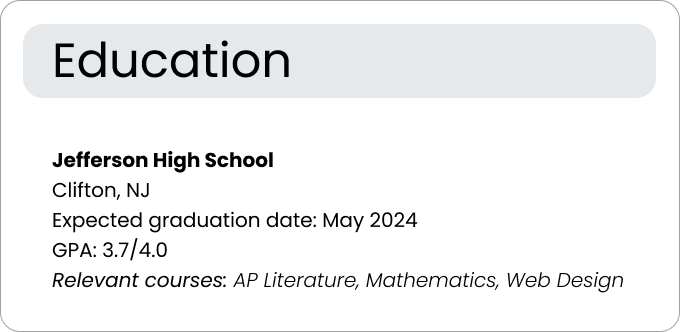
Graduated
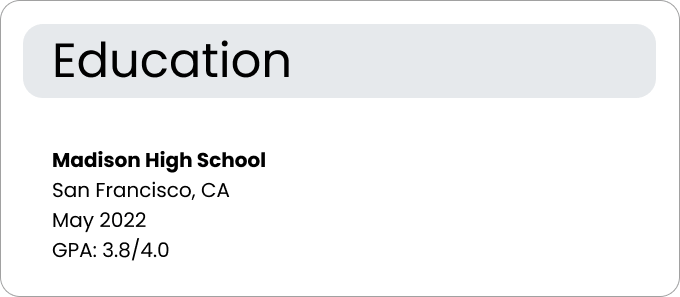
If you’ve completed a higher education degree, then there’s no need to include your high school education on your resume.
College student/recent graduate
If you’re currently in or graduated from university, you should always include your degree on your resume. Even if it’s not relevant to the job you want, a college degree is often a requirement for professional-level positions.
Currently in school
Here’s an example of how to list an unfinished degree on your resume:
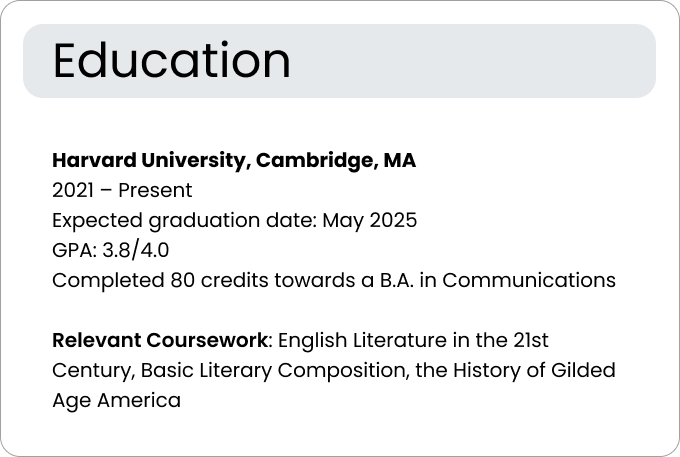
Graduated
If you’ve completed your degree, here’s how you can list it on your resume:
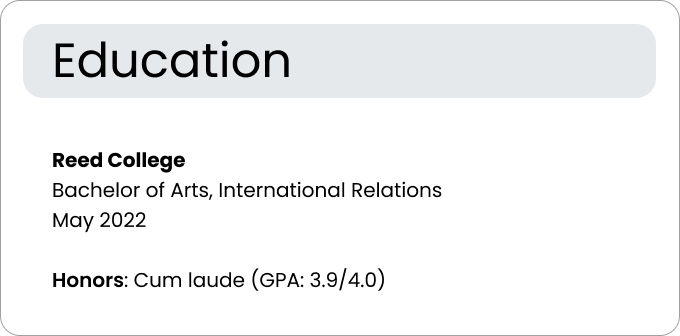
Study abroad program
Here’s an example of how to list a study abroad program on your resume:
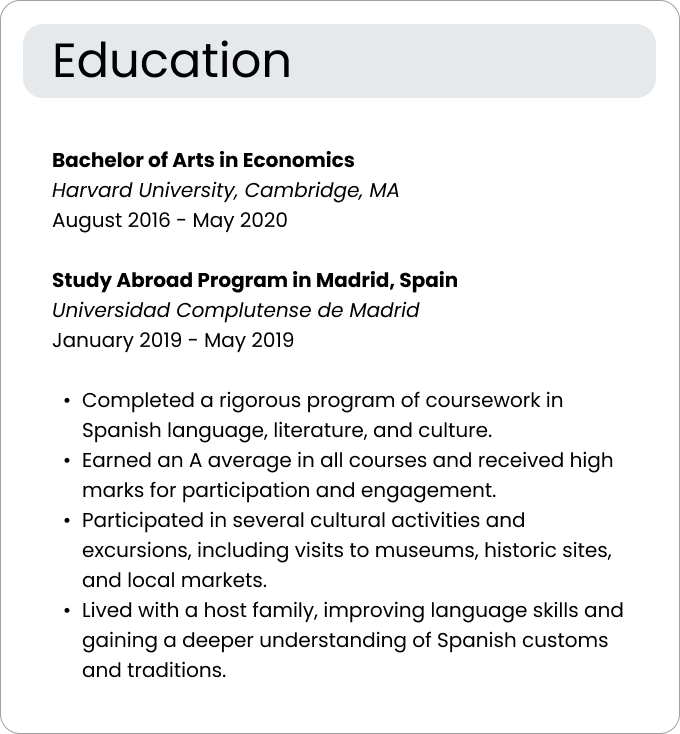
In this example, the candidate expands on their study abroad experience by including several bullet points that describe what they achieved through the program. If language proficiency is relevant to the role you’re applying for, using experience like this can give you an edge over other candidates.
Graduate student (master’s)
Here’s an example of how to list a master’s degree on your resume:
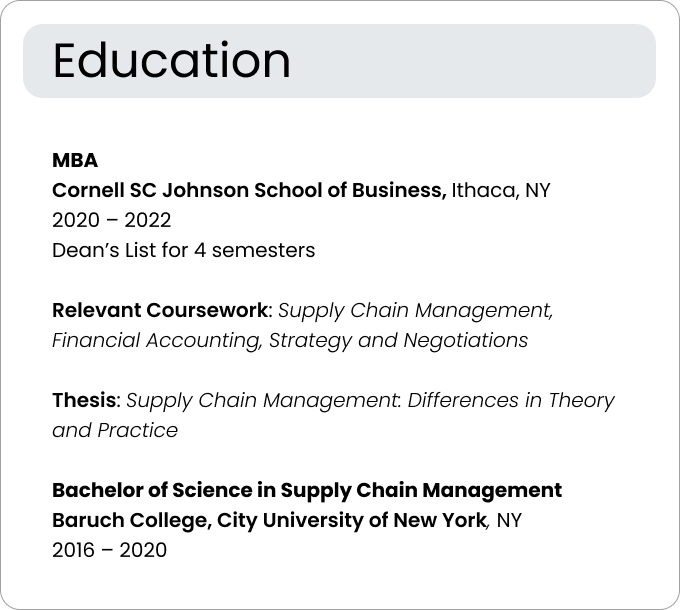
Doctorate student (PhD)
If you’re applying for positions that require a PhD, you should make sure to include your dissertation in addition to when you earned your degree. Here’s an example of how to include a doctoral degree on your resume:
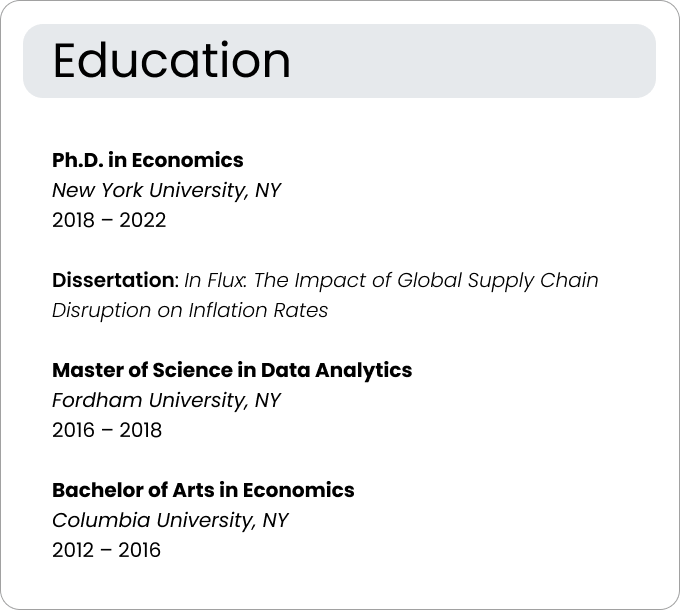
Working professional education section
If you’ve already entered the workforce and have a few years of experience, your education section should be short and to the point, like this:
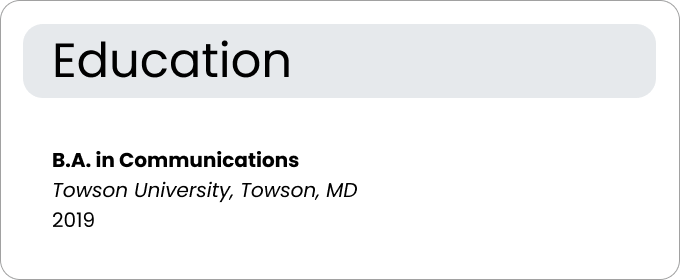
Continuing education
If you’re actively pursuing professional development, or have taken courses to develop industry-specific skills, you can include this experience as continuing education on your resume.
If you just have a course or two to add, it can go in your education section. If you have more, consider making a specific section devoted to your continued education.
Here’s an example:
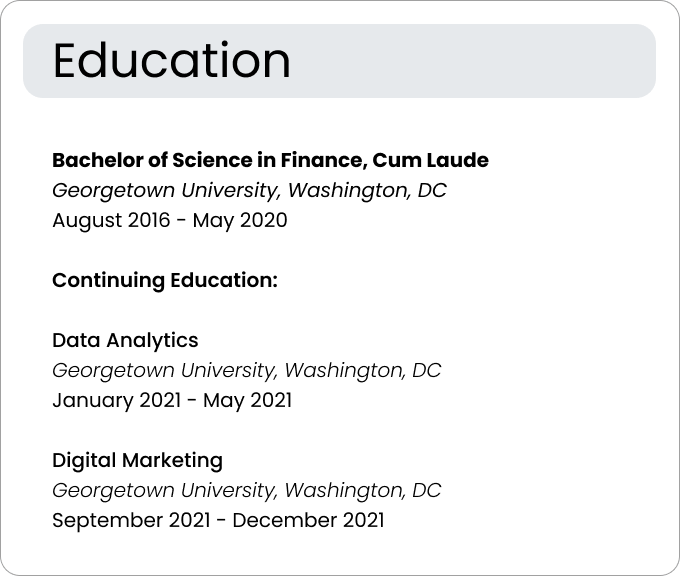
Listing relevant courses that you’ve taken since graduating shows employers that you’re a self-starter and motivated to develop professionally.
Frequently asked questions about resume education sections
If you still have more questions about how to list education on your resume, check out these commonly asked questions we’ve answered below:
Where should education go on a resume?
Education should go on your resume in a place where employers can clearly see it. The best placement for your education section depends on your level of experience.
If you’re an entry-level candidate, putting your education near the top of your resume can show employers that you have the qualifications they’re looking for.
If you’re an experienced candidate, employers will be more interested in your work experience section, so you can put your education at the bottom of your resume.
What should I put under education on my resume?
You should put the following information under education on your resume:
- Your highest level of education achieved, including the degree, major, institution and location, and years of attendance and graduation.
- Optional information that highlights your academic accomplishments such as GPA, honors and awards, relevant coursework, study abroad programs, scholarships and grants, extracurricular activities, or a thesis.
What does level of education mean on a resume?
What “level of education” means on a resume is the highest level of education you completed. The basic categories include high school, undergraduate degree, graduate degree, and doctoral degree.
If you attended school but didn’t graduate, you can still list your academic experience on your resume. Simply include the years you attended and, if applicable, the date you expect to graduate.
What do you put for highest level of education if you’re still in high school?
If you’re still in high school, put some high school for your highest level of education. Here’s an example of how you can list unfinished high school experience on your resume:
Centaurus High School, Boulder, CO
2021 – Present
Expected graduation: May 2025
GPA: 3.7/4.0
Should I put education or experience first on my resume?
You should put education first on your resume if you’re a student, a recent graduate without professional experience, or if you’re writing a career change resume and your education is more relevant to the position than your work experience.
You should put experience first on your resume if your work experience is more relevant to the position you’re applying for, which should be the case for most job seekers with some experience.
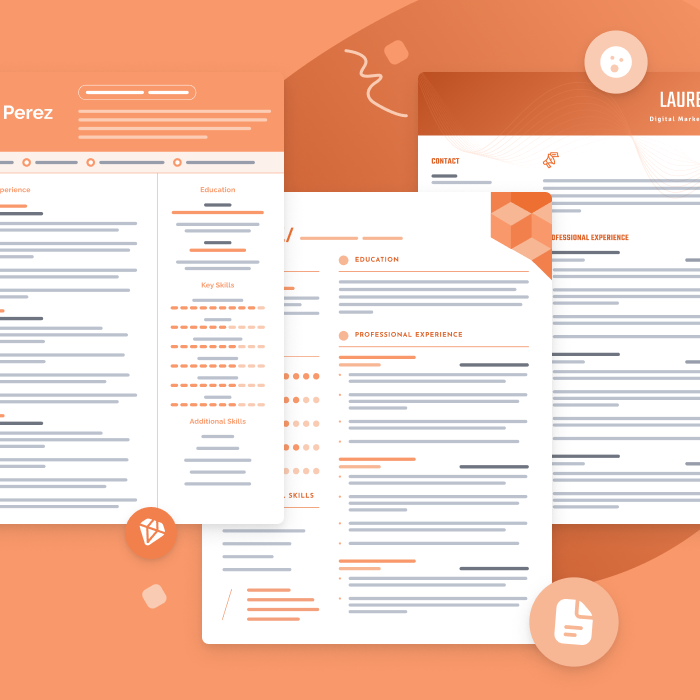
The best resume templates for 2024
One of the best ways to make your resume is by filling out one of our free resume templates. All our templates are designed by experts and free to download for Microsoft Word or Google Docs.
Click to rate this article
4.4 Average rating


